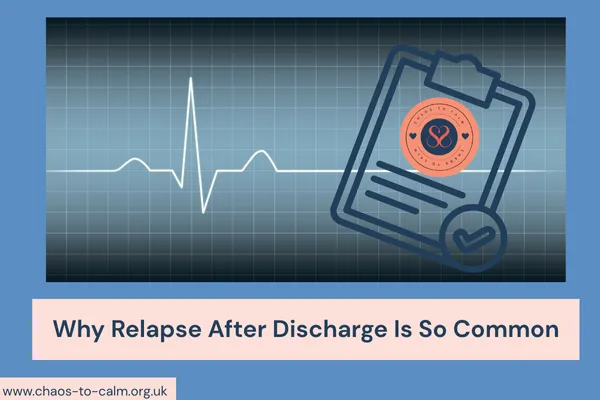
Learning in the Storm: Why Relapse After Discharge Is So Common
Learning in the Storm: Why Relapse After Discharge Is So Common

Because safety on paper doesn’t always mean safety in real life.
Content warning: mentions of self-harm, crisis and readmission.
When someone is discharged from the hospital, you’re told there’s a “plan.” A safety plan, a home-based team, a follow-up call. On paper, it looks reassuring. In reality, it often doesn’t hold.
Five days after discharge, she was readmitted.
And as much as that broke me, I wasn’t shocked. Because relapse after discharge is more common than anyone wants to admit.
Here’s what I’ve learned since:
1. The system measures stability, not safety
If someone’s calm, polite, and cooperative, the system assumes they’re okay. But masking is common, especially for people who’ve learned that showing distress gets them punished or misunderstood.
Learning: “Engaging well” doesn’t always mean stable.
2. The first week home is the most dangerous
The structure of the ward disappears overnight. There’s too much quiet, too much freedom, too many memories waiting in the walls. It’s no wonder things unravel fast.
Learning: Plan discharge like you’d plan a storm shelter, what’s in place, who’s on call, and how to ride the first few days safely.
3. Support teams are overstretched
Home-based or crisis services sound good, but most are under-resourced. Calls are missed, shifts change, and families get left holding it all.
Learning: Always ask who will be calling, when, and what to do if they don’t. Write it down and hold them to it.
4. Parents see what professionals can’t
Staff see a snapshot; parents see the patterns.
You notice the flat tone, the withdrawal, the subtle changes that mean something’s off.
Learning: Trust your gut, it’s usually right.
5. Relapse isn’t failure
When it happens, it feels like you’ve gone backwards. You haven’t. Every admission, every crisis, every night you kept them safe, it all counts. This isn’t a straight line.
Learning: Recovery is a spiral, not a ladder. Sometimes you circle back before you move forward.
Final thought
We talk about discharge like it’s an ending. It’s not.
For families like ours, it’s just another checkpoint in an endless loop of fear, hope, and resilience.
If you’re living that loop right now, hold on.
You are not doing it wrong. You’re surviving something most people couldn’t imagine.
Your calm in the chaos,
Sami xx
